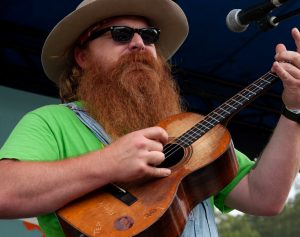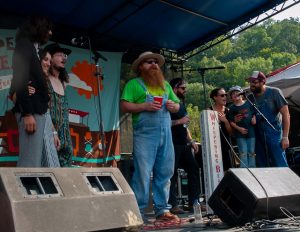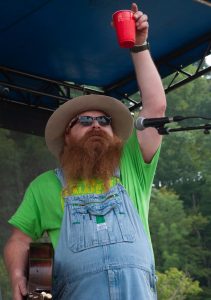words MICHAEL KEARNS | photography MICHAEL KEARNS & MATT STEFFEN
He’s, more or less, forty-two and a half. He grew up in North Central California about an hour and a half from Yosemite. His hometown was, is, known, primarily, for two things, gold and cattle. He grew up with a brother who is seventeen months his junior. Growing up they were very close. They still are.
His mother and father divorced when he was young though he still loves them and they him.
 His father, always a cattleman, stayed on the ranch while his mother moved to town.
His father, always a cattleman, stayed on the ranch while his mother moved to town.
Willy Tea Taylor could have walked out of a Steinbeck novel, straight from central casting.
Of his brother, he says, even when they’ve been apart for a while, there’s no need to catch up, “We’ve never really been apart,” he says. “As soon as I see him, it’s, ‘hello pudwacker,’ and we keep moving on.”
Elaborating, he says, “He’s a hell of an infielder, a great second baseman.”
He offers this compliment in a tone which suggests that there can be few higher compliments.
Taylor, growing up, caught . We bond over that. I tell him I grew up in Cincinnati catching little league when Johnny Bench caught for the Reds.
Taylor remembers Bench, which is no surprise because he’s an old school kind of guy. Lots of guys, of course, claim to be old school, but one need only spend a brief amount of time around Taylor to confirm that his songs, his music, are from another time. For one thing, he plays a tiny 1927 four string Martin.

Unlike so many singer songwriters today, he’s not all about the spotlight. Watching Taylor play, it’s clear that his performance is all about the song and not him. He’s a profound singer songwriter with a direct POV; maybe Leon Redbone without the profoundo basso.
He creates a sound reminiscent of some prior period you just can’t name, but, which is, at the same time, rather hopelessly unique to him. His sound is, at once, unique, disarming and inviting. It never occurs to the listener not to consider his words. Which is a good thing because the man can flat out write.
 At the Whispering Beard Fest in Friendship, Indiana we catch him walking down the gravel drive into the festival. He’s been at the tavern, across the street, watching the Little League World Series; Georgia and Hawaii were playing. The next game is tomorrow at three o’clock.
At the Whispering Beard Fest in Friendship, Indiana we catch him walking down the gravel drive into the festival. He’s been at the tavern, across the street, watching the Little League World Series; Georgia and Hawaii were playing. The next game is tomorrow at three o’clock.
He’s troubled because his set is tomorrow at three-thirty.
“I hope they don’t mind that we might be starting late,” he says.
“Maybe,” someone suggests, “we can get them to place a tv put on the side of the stage.” Taylor nods clearly considering the wisdom of the suggestion.
In case you haven’t caught on, the man still worships the game. His old man-the cattle rancher-taught he and his younger brother baseball.
He also loves this festival-The Whispering Beard-not just because it’s tightknit group of family worshiping woodland songwriting for three days every year; but also because The Beard, now in its eleventh year, is a music festival wrapped around a baseball game. Literally.
At the center of this small festival, is a whiffle ball field. There is a plate, bases, a proper mound and a wall-made of pallets- the entire length of the outfield.
The field is built every year, raised along with the stages, and games are held. Some games are held by musicians and others in the deep dark of the night, during and after the midnight jam session and the oversized requisite bonfire. These are pick-up games.
 The important game, the one he’s here for, is played on Sunday, after the music is over and the essential chores have been taken care of. Willie Tea has played for the Smoking Lefties four times, and they’re two and two against the Beardos.
The important game, the one he’s here for, is played on Sunday, after the music is over and the essential chores have been taken care of. Willie Tea has played for the Smoking Lefties four times, and they’re two and two against the Beardos.
“It’s the tie-breaker this year,” he says. And it’s clear that he’s as excited about the game as about his set.
He says that he normally likes to arrive at the festival early so he can help with the setting up. He’s chagrined that he couldn’t get in early this year due to tour conflicts.
I ponder these words which I’ve never heard any musician speak about any other festival.
Baseball. It’s one of the sacred subjects. He still loves the game and the old man.
He tells about how one time the great Beardo-Lefty game was washed out by a storm. The founders created a small field inside a large nearby shed where the disputed match could be finished.
“Now that’s dedication to the game,” he says admiringly.
I ask him if I were to cut out his heart and soul, what else would reside there beside baseball? What else is at the core of his music?
“If you cut the heart out of my music,” he says without a pause, “it would be made of dogs, baseball, love and death.”
He’s been writing songs he says, “since he fell in love with that cute girl in the first grade.”
And I think that Taylor not only reminds me of Steinbeck, but another California writer as well, Richard Brautigan. An eccentric man who could, in clear, simple and elegant terms of classic American themes.
“The girl was very pretty and her body was like a clear mountain river of skin and muscle flowing over rocks of bone and hidden nerves,” said Richard Brautigan, Trout Fishing In America.
In an astoundingly poignant song called Nothing Ever Dies, Taylor sings of a dead lover, her body washed by her love, between death and burial, as she becomes, in the process, a kind of river herself.
“Find cool waters, let your sorrows drain
Live like the river my love and welcome the rain
You too will join me one day but not now
Trust in those waters, let go and drift on down…”
They’re both seemingly simple, Brautigan and Taylor. Their work is, on its face, simplistic; but such reductionism fails to give either writer their due. The great Mexican critic and poet Octavio Paz, said that sentimentality was attempting to cheaply evoke, from the reader, an unearned emotion. Both Taylor and Brautigan reach the readers heart, and the vast prehistoric and universal emotions contained within, honestly, in the fewest authentic steps possible.
“I lie here in a harbor/ that does not know/ where your body ends/ and my body begins. Fish swim between our ribs/ and sea gulls cry like mirrors/ to our blood,” Brautigan once wrote.

“I might not be too good at most things I do/ But I’m the very best at missing you…” succinctly, plainly and beautifully sings Taylor.
There is also in both writers an overarching romanticism threaded with more than a little of Garcia Marquez’s magical realism.
“One spring afternoon as a child in the strange town of Portland, I walked down to a different street corner, and saw a row of old houses, huddled together like seals on a rock.” Braughtigan-Trout Fishing In America.
“Hummingbirds never stop for too long/ They fly to a different song/Hummingbirds ain’t never been wrong.” Willie Tea-Hummingbird.
Both writers also possess the ability to imbue the ordinary world with an optimism and hopefulness that’s probably better than we collectively deserve at this point our evolution. And yet so direct, simple and honest is Taylor’s playing, are his songs, that as with Brautigan’s writing, he encapsulates entire world views while concomitantly sledgehammering even the most encrusted hearts.
“I sat there watching their living room shining out of the dark beside the pond. It looked like a fairy-tale functioning happily in the post-World War II gothic of America ….,” Richard Brautigan- So the Wind Don’t Blow It All Away.
“It’s a river so cold
It’s Benny’s homemade wine
It’s old folks in love, still drinking side by side
It’s buckets of joy
It’s a pinch of sorrow
Its singing in the streets like were all dying tomorrow
It’s playing catch with my boy
It’s a chicken fried steak
It’s I got your back whatever it takes
It’s a pretty, pretty girl
It’s a good whiffle ball team
It’s everything sacred, it’s that slow moving dream
You ask me where I’m from well this is where I’m from,
you ask me where I’m from, well this is where I’m from”– Willy Tea Taylor, Life is Beautiful
It takes heart to stand through a Taylor set. Grown men, and women, weep, finding themselves suddenly caught in the nets of something real, something they once desperately loved, something they thought was destroyed a very long time ago.
And Taylor, and his four-string guitar, with the sparest of instrumentation and accompaniment, brings all of these things back to life, before their eyes, and causes them to remember that there’s still much worth living for, celebrating.
And the words and the music, especially the first time you hear him, meet him, are shocking. It’s hard to imagine such sweet words coming from a man buried beneath his great flowing auburn beard, omnipresent shades and low slung broad brimmed hat. He looks like a recluse, a hermit, maybe a simpler soul, yet, even the shortest conversation with Taylor dispels such thoughts.
 He’s a kind man with a good heart and an immense talent. And a definite ability to surprise.
He’s a kind man with a good heart and an immense talent. And a definite ability to surprise.
Of religion, seemingly out of nowhere he says, “I love the story of Jesus.”
I attempt not to fall out of my chair and ask, “what?”
The golden rule he says, “is catching and throwing, giving and receiving.”
Going with the flow, I ask, what position did Jesus play?
“Jesus was a pitcher,” Willy says. To which, I have nothing.
Welcome to the world of Willie Tea Taylor. A great protean mind and a gift for chatting. He loves the endless conversations that flow during the Beard, and while he is on the road. The road and the people he meets, are an essential part of his world, part of his art.
You’re never quite sure where a conversation is going to take a hard left or right. He’s fond of offering, not so much non-sequiturs, but seemingly random observations. A conversation about songwriting can, for instance, contain the observation that, “In baseball, attitude is everything”
More than anything, however, and no matter what the topic, Taylor is memorable and notable for his big heart and love of his fellowman. In an age of cynicism and hatred, he’s a soulful outlier.
At the end the day, Taylor rings the common human cords.
Methodically, Taylor says in his songwriting, he spends a lot of time trying to work out particular problems personal to him.
“Many, many times,” he says, “people then come to him and tell him that the resulting song,” his private words made public, “helped them to work through or even survive hard times.” He says that he finds it amazing that so many people tell him that they benefit from his words, when he’s writing for himself.
Does this mean, I ask, that even in this contentious world that we tend to be much more alike than we realize or wish to admit? Susceptible to the same fears and comprised of the same hopes?
Taylor says that he thinks as such.
 “If the intention is there and I can get there and feel it, that the highest level on which I can communicate with myself and then with you. Sometimes, you find that by talking to yourself, that’s what others need to hear.” Music, he has come to understand, is the one true language.
“If the intention is there and I can get there and feel it, that the highest level on which I can communicate with myself and then with you. Sometimes, you find that by talking to yourself, that’s what others need to hear.” Music, he has come to understand, is the one true language.
Chickamauga, he says is a song he wrote for his nephew who was about to go to war. Historically a song about the second-costliest land battle of the American Civil War (34,624 casualties), the pervasive and ageless themes of loss, ring true with many present-day vets.
His nephew has since made it back and he, and many others who have come and gone, later making it a point to hunt out Taylor; to tell him how much the song has helped them.
“So many of those guys have seen such ugliness and they tell me how much this song has helped them to cope,” he says with obvious wonderment and gratitude.
“I can’t imagine that,” he says, “I can’t imagine what they’ve seen, they’ve seen things I never want to see and yet they tell me my words, my music has helped them.”
“your skin is the softest thing i ever known,
your face is the prettiest one in Ohio,
your tears fell and mingled with the pouring down rain,
you were my first kiss my last kiss then i hopped on that train,
off to dc where the boys go out fighting,
lil sam an ol charlie watson by my side,
couldn’t wait to be absorbed in all that glory,
we were to young and we were to swift to die”
It’s clearly a gift which confounds and amazes him. As does his life. “I’m, right now, at the corner of Bukowski and Buddha,” he says.
His time in the dark and the light is something he finds hard to explain, and a lifestyle which can lead to hardships. He’s been married and divorced twice.
 “I don’t expect anyone to understand, how it is that I find myself sitting in a bar in Utah….,” his voice trails off, he’s searching, then offers, “the thing I fear the most is that I kind of like it in the dirt, in the mud. When you’re under a tree with a bottle of moonshine, that’s a powerful thing as well.”
“I don’t expect anyone to understand, how it is that I find myself sitting in a bar in Utah….,” his voice trails off, he’s searching, then offers, “the thing I fear the most is that I kind of like it in the dirt, in the mud. When you’re under a tree with a bottle of moonshine, that’s a powerful thing as well.”
Like all of us, Taylor hasn’t clarified his personal philosophy to the point where he’s willing to carve it in stone, though he is, he says, clear on some things.
“I have a plan,” he says, “to take care of myself and take care of my people, be open and do what’s right, we’ve only got one shot…we all need to work together, we all need to be one team, headed for the World Series.”
There is little doubt Taylor possesses the gift of giving voice to our most common aspirations and woes. He can reach crowds in way few songwriters can these days. He’s man enough to live with and share an open heart. And when a crowd is brave enough to withstand their own humanity for a set, he delivers musical communion.


